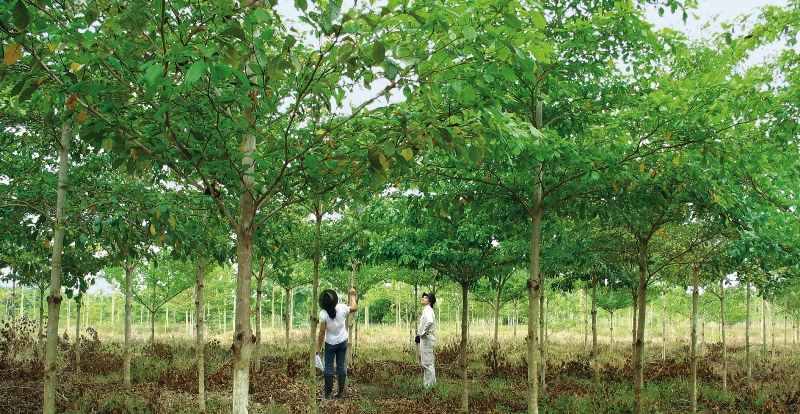Wood is a natural product. It grows across the globe, in public and private spaces. Some trees are planted to be grown into lumber, but some are not. Some lumber is harvested ethically, but not all. This is why certification and origin are two crucial factors to examine when selecting a flooring product.
Relative Space only sells products that meet our own environmental, social, and ethical standards. Products that sacrifice the environment or welfare of their makers to save costs don’t interest us. Certifications give us peace of mind that the supply chain we participate in supports our values and, in the interest of transparency, gives us confidence to sell the certified products to clients who share those values. We also add our own touch by investing in carbon sequestration programs.
The legal requirements for wood products and importers are low. For example, the “Made in” label only refers to where the product is finished. Without FSC certification, a “Made in Netherlands” product could use plywood made in China with wood grown in Russia so long as the two pieces are glued and finished in Netherlands. Forest Certification (FSC or PEFC) is the only way to know the wood used in those components is responsibly grown and harvested.
With the recent news of a large manufacturer having their FSC certification suspended, it’s a good time to highlight the particular standards and qualities of each certification and what they mean.
These are some of the certifications currently held by Relative Space’s products:
RealWood
Certifies that wood is all real wood, not a composite or plywood. Engineered wood products are not required to indicate their composition, and it may not be obvious at a store. This certification lets you know the product is truly 100 percent wood. Read More About RealWood Certification
FSC
Certifies forests along with the chain of custody (CoC) all the way to the retailer. FSC ensures responsible sourcing and harvesting of wood with a social awareness — every person who touches the product must follow FSC rules for a product to retain the certification. FSC is one of the most widely held, most trusted, and best known certifications. Read More About FSC
PEFC
Another forest certification agency that is very similar to FSC and more common in Europe. Read More About PEFC
NOTE: FSC and PEFC certification are so widespread that if a product does not have them available, it is worth asking why. Note that many small producers do not have them as they are expensive and a lot for a small company to manage.
CARB2
The California Air Resources Board standard that restricts formaldehyde emissions. While wood has small amounts of natural formaldehyde, plywood-based products tend to have more formaldehyde — and in worse situations, added urea-formaldehyde — due to the manufacturing process. This is also true of many wood-substitute products. Read More About CARB2
GUT
A textile-specific certification that looks at the full lifecycle of a product and its impact on consumers. As textiles are generally not natural, it is especially important. GUT is constantly evolving to ensure products are manufactured in a safe manner, that their end-of-life is manageable, and that they’re not full of chemicals. While mostly on European products, GUT standards are much stricter than North American equivalents. Read More About GUT




